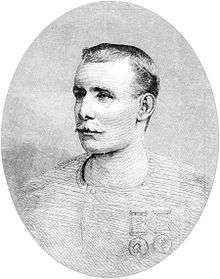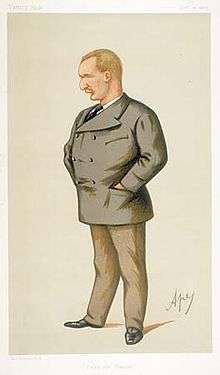Matthew Webb
| Matthew Webb | |
|---|---|
 Webb in 1883 | |
| Born |
January 19, 1848 Dawley, England |
| Died |
July 24, 1883 (aged 35) Niagara River, Niagara Falls |
| Resting place | Oakwood Cemetery |

Captain Matthew Webb (19 January 1848 – 24 July 1883) was the first recorded person to swim the English Channel without the use of artificial aids for sport purpose. On 25 August 1875, Webb swam from Dover to Calais in fewer than 22 hours.[1]
Early life and career
Webb was born at Dawley, Telford in Shropshire, one of twelve children of a Coalbrookdale doctor. He acquired his ability to swim in the River Severn at Coalbrookdale.[2] In 1860, at the age of twelve, he joined the training ship HMS Conway for two years, then entered the merchant navy and served a three-year apprenticeship with Rathbone Brothers of Liverpool.
Whilst serving as second mate on the Cunard Line ship Russia, travelling from New York to Liverpool, he attempted to rescue a man overboard by diving into the sea in the mid-Atlantic. The man was never found, but Webb's daring won him an award of £100 and the first Stanhope Medal, and made him a hero of the British press.[3]
In the summer of 1863, while at home, he rescued his 12-year-old brother Thomas from drowning in the Severn near Ironbridge.[2]
English Channel swimming record
In 1873, Webb was serving as captain of the steamship Emerald when he read an account of the failed attempt by J. B. Johnson to swim the English Channel. He became inspired to try himself, and left his job to begin training, first at Lambeth Baths, then in the cold waters of the Thames, the English Channel and Hollingworth Lake.[4] His early training was backed by Fred Beckwith who was the "Professor" at Lambeth Baths. Beckwith organised a spectacle by showing Webb swimming miles in the River Thames. Webb completed ‘nearly six miles’, but the poor public interest meant that Beckwith lost money. As a result Webb took another manager.[5]
On 12 August 1875, he made his first cross-Channel swimming attempt, but strong winds and poor sea conditions forced him to abandon the swim.[6] On 24 August, he began a second swim by diving in from the Admiralty Pier at Dover. Backed by three escort boats and smeared in porpoise oil, he set off into the ebb tide at a steady breaststroke. Despite stings from jellyfish and strong currents off Cap Gris Nez which prevented him from reaching the shore for five hours, finally, after 21 hours and 45 minutes, he landed near Calais—the first successful cross-channel swim. His zig-zag course across the Channel was over 39 miles (64 km) long.
Later life
After his record swim, Captain Webb basked in national and international adulation, and followed a career as a professional swimmer. He licensed his name for merchandising such as commemorative pottery,[7] and wrote a book called The Art of Swimming. A brand of matches was named after him. He participated in exhibition swimming matches and stunts such as floating in a tank of water for 128 hours.
On 27 April 1880, he married Madeline Kate Chaddock, and they had two children, Matthew and Helen.
Death
His final stunt was to be a dangerous swim through the Whirlpool Rapids on the Niagara River below Niagara Falls, a feat many observers considered suicidal. Although Webb failed in an attempt at raising interest in funding the event,[8] on 24 July 1883, he jumped into the river from a small boat located near the Niagara Falls Suspension Bridge and began his swim. Accounts of the time indicate that in all likelihood Webb successfully survived the first part of the swim, but died in the section of the river located near the entrance to the whirlpool.[9] Webb was interred in Oakwood Cemetery, Niagara Falls, New York.[10]
Legacy
In 1909, Webb's elder brother Thomas unveiled a memorial in Dawley, Telford. On it reads the short inscription: "Nothing great is easy." The memorial was taken away for repair after a lorry collided with it in February 2009. The landmark memorial was returned after full restoration and was hoisted back onto its plinth in High Street in October 2009. Two roads in the town (Captain Webb Drive and Webb Crescent) and the Captain Webb Primary School in Dawley are named after the swimmer. A memorial plaque with his portrait was also unveiled in the parish church at Coalbrookdale. Webb House of the Adams' Grammar School in Newport, Shropshire, is named after Webb.
Cultural references

John Betjeman's poem "A Shropshire Lad" (1940) commemorates the death of Captain Webb, portraying his ghost swimming back along the canal to Dawley.[11] It was set to music by Jim Parker and has been the most requested song on the repertoire of John Kirkpatrick during his entire career.[12]
Captain Webb's picture on boxes of Bryant and May matches is said have inspired the physical appearance of the Inspector Clouseau character portrayed originally in the Pink Panther films by Peter Sellers.[13]
References
- ↑ "How The Channel First Was Swum. Captain Webb, Son of a Physician, Received Training as Sailor in China Trade. Killed In Niagara River. Tried to Cross Rapids in 1883 and Was Lost". New York Times. August 23, 1925.
- 1 2 "Captain Matthew Webb". Meadow Pit Memorial Gardens.
- ↑ Charles Sprawson, ‘Webb, Matthew [Captain Webb] (1848–1883)’, Oxford Dictionary of National Biography, Oxford University Press, 2004; online edn, Sept 2010 accessed 16 Oct 2016
- ↑ "Hollingworth Lake – a 200-year story of glory and tragedy". Manchester Evening News. 24 April 2005.
- ↑ James Lambie (2010). The Story of Your Life: A History of the Sporting Life Newspaper (1859-1998). Troubador Publishing Ltd. pp. 173–. ISBN 978-1-84876-291-6.
- ↑
 Seccombe, Thomas (1899). "Webb, Matthew". In Lee, Sidney. Dictionary of National Biography. 60. London: Smith, Elder & Co.
Seccombe, Thomas (1899). "Webb, Matthew". In Lee, Sidney. Dictionary of National Biography. 60. London: Smith, Elder & Co. - ↑ Mason, Paul (10 October 2013). "Heroes of swimming: Captain Matthew Webb". The Swimming Blog. The Guardian.
- ↑ "Capt. Webb Missing Yet. No Trace Of His Body Found By The Anxious Searchers". New York Times. 26 July 1883.
- ↑ "Captain Webb's Manager". New York Times, pg. 10. 29 July 1883.
- ↑ "Captain Webb". The Globe and Mail. 1 August 1883.
- ↑ http://www.sanjeev.net/poetry/betjeman-john/a-shropshire-lad-182173.html
- ↑ http://www.worldcat.org/title/every-mortal-place/oclc/849279584&referer=brief_results
- ↑ Nixon, Rob. "The Big Idea: The Pink Panther". TCM. Retrieved 31 May 2014.
Further reading
- Elderwick, David (1987). Captain Webb – Channel Swimmer. ISBN 0-947731-23-7.
- Sprawson, Charles (1992). Haunts of the Black Masseur – The Swimmer as Hero. ISBN 0-8166-3539-0.
- Watson, Kathy (2000). The Crossing – The Glorious Tragedy of the First Man to Swim the English Channel. ISBN 978-1-58542-109-1.
- Webb, Matthew. The Art of Swimming. ISBN 0-946014-78-7.
External links
| Wikimedia Commons has media related to Matthew Webb. |
- Matthew Webb's gravesite
- Two images from the Niagara Falls Public Library (Ont.)
- Bust of Captain Matthew Webb on Dover Seafront – Photograph of statue plus description
- Cemetery where Capt. Webb is interred. – Oakwood Cemetery, Niagara Falls, NY